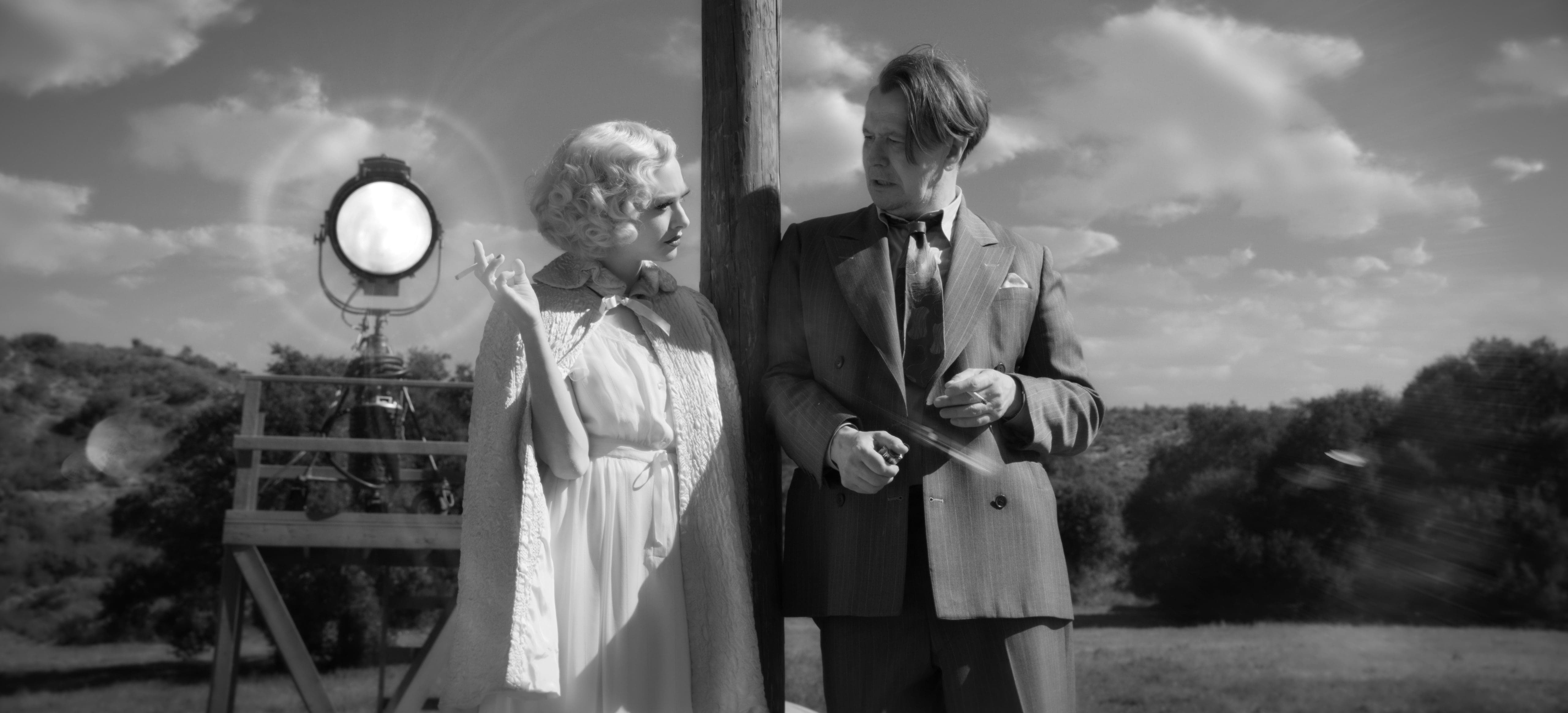
Written by Samuel Niles
Authenticity is a chief concern in David Fincher’s Mank. The black and white cinematography is rife with traditional film “errors” and cue marks, adding an analog texture to the all-digital production. He and decade-long collaborators, composers Trent Reznor and Atticus Ross, also use only period accurate instruments for the score. But authenticity is also a narrative concern—in (appropriately) opposing ways.
Focusing primarily on the writing of Citizen Kane, authenticity fuels Mank‘s two conflicts: the 1941 film’s authorship, and its inspiration. On the one hand, we have the titular Herman J. Mankiewicz (Gary Oldman) butting heads with Orson Welles (Tom Burke) over credit on the picture. On the other hand, we have him selectively emphasizing the script’s influences, making a point to insult William Randolph Hearst (Charles Dance) by insisting it’s about him, all while undermining the influence of Hearst’s lover, Marion Davies (Amanda Seyfried), who Mank claims to care about.
But authenticity is also a concern for Mank in another, less admirable sense, and it comes in the form of the following question: “Is this what happened?”
Sometimes a moment in an historical film can be so shocking that you have to pause it to find out if it “truly” happened like that. If the drama is effective, learning that a detail is embellished or fabricated might be waved off. Conversely, drama that is ineffective because of initial doubts of historical authenticity might be salvaged by learning that it is historically accurate.
Mank‘s characters feel like they’re saying dialogue from a movie in the ’40s, shot on what looks like film stock from the 40’s, recorded on technology from the ’40s, with music from the ’40s, but is it a movie from the ’40s worth investing in? The answer is as conflicted as its title character. While Mank is a technical marvel, it’s one that doesn’t emotionally resonate.
Throughout, the film simultaneously romanticizes and rather harshly criticizes its protagonist. Two scenes in particular stand out on that front, both focusing on his alcoholism. The first is during the writing of Citizen Kane. Mank spends the majority of the film at a “dry” ranch, so he’s nice and sober enough to write the script. But Mank doesn’t want to be nice and sober, so, with the help of housekeeper Fraulein Frieda (Monika Gossmann), he replaces his bottles of tranquilizers with alcohol. His secretary Rita (Lily Collins) does not approve and she confronts Frieda, telling the Fraulein that she doesn’t need to fear him. Frieda insists she isn’t afraid, though and sneaks in the alcohol proudly because Mank was the only person who helped her family get safely out of Germany.
Frieda’s indifference to Mank’s alcoholism and contentment with simply fulfilling his wishes, while not beyond criticism, is understandable—and that it can be criticized while being understood seems to be a part of the text. Less understandable is Rita’s drop of a hat change of heart. Immediately upon learning about what Mank did to help Frieda’s family and village, Rita goes from “your alcoholism will destroy you” to “I’ll enable your alcoholism.” Because of Rita’s response, any emotional investment in Frieda’s history and actions becomes sort of nullified. Her actions are no longer an expression of the messy conflict of enabling “tragic geniuses”, but are reduced to some factor in a mathematical equation where Frieda’s history + Rita’s response = plot moves forward.
The second scene is a flashback near the end of the film, where an inebriated (to put it lightly) Mank shows up at a party. The party is not for him, but the drunken writer makes it about him as he monologues in a not-so-thinly veiled manner against William Randolph Hearst, the host, as he lays out the foundation for what would later become Citizen Kane. People slowly but surely leave during this drunken diatribe and once his word vomit becomes actual vomit, everyone, including Marion, leaves. This scene is a culmination of Mank’s insistence that he’s just criticizing the Hearst he doesn’t care for, rather than the Davies he does care for. However, as loudly and proudly as he insists this, it doesn’t change the fact that it’s the volume and pride themselves that hurt Davies.
And yet, for all the points off the list the monologue checks on a script level, none of it really hits home. Oldman’s performance is in some ways admirable, but it ultimately reads disingenuous. He slurs through the words in a way people do when they act drunk, not when they actually are drunk. It feels as though he’s trying to achieve “the way they acted in the ’40s” rather than the emotional truth of the moment.
In its recreation of films and Hollywood in the 1940s, Mank is an unquestionable technical marvel. Where it falls short is in making sure all of that precise filmmaking means something to the viewer. It is still worth watching and it may improve on rewatches, but, at first glance, it doesn’t resonate as much as it should.

